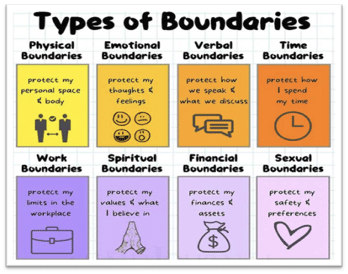by Maddy Archambault, LAC
“You just have to set more boundaries!” is a phrase that seems to be omnipresent in the cultural lexicon at the moment. But what if we don’t know where to start?! Let’s define boundaries as well as how we can set them.
What are relationship boundaries?
Boundaries refer to the guidelines, limits, and expectations that individuals establish to protect their physical, emotional, and mental well-being while interacting with others. The below graphic captures the many kinds of relational boundaries that we can hold:

IMAGE SOURCE: In Mind Out
Boundaries vary greatly depending on cultural norms, personal values, and the nature of the relationship. For example, a professional relationship would call for much different boundaries than in a romantic relationship. Context is key.
Why are boundaries important?
Many people fear that boundary setting may cause their relationships to suffer. However, the contrary is true: Boundaries enrich and enhance our relationships. If we are in a relationship with little to no boundaries, resentment usually follows. Healthy boundaries allow us to feel respect and contentment, therefore more interpersonal closeness as a result.
What does a boundary sound like?
Boundaries are not orders that we make of others, but rather actions that you promise to take if certain conditions aren’t met. Here are a few examples:
- If you continue to make comments about my body, then I will hang up.
- If you cannot give me space while I am upset, then I will have to leave.
- If we cannot find a compromise on my salary amount, then I will work on finding a new job.
How do I set a boundary?
As you can see in the above, setting a boundary has two main parts:
- communicating the boundary
- Holding the boundary through repetition and self-led behavior
The second part of this formula is key. We cannot expect to “set it and forget it” with boundaries; they usually must occur several times, over the course of time before they are solidified as the new norm. So, if you set a boundary once and it “doesn’t work,” don’t fret — know that that is a totally normal part of the process!
This might sound like a lot of work, and it can be. However, it is empowering to note that you have this kind of power and influence over your relationships; and also, the short term discomfort generally leads to long term gains.
Ok, so do I need more boundaries?
If you are unsure whether you could benefit from firmer boundaries, try this quick exercise: do an internal scan of your life’s “relationship buckets” — work colleagues, romantic interest(s), friends, family members. Then, check in with your body and emotions. How do you feel in those relationships and towards those relationships?
If you notice pangs of resentment, tension or unease, it may be a sign that a shift in boundaries could help.
If you are struggling interpersonally with healthy boundaries or relationships, you are not alone. The therapists at Mindful Power can provide a therapeutic space to explore these patterns and help support you on a path to transformation.
Counseling Hoboken; Mollie Busino, LCSW, Director of Mindful Power. Mollie has had extensive training in Cognitive Behavioral Therapy, Fertility Counseling, and Post Traumatic Stress Disorder (PTSD). Her work focuses on Anxiety, Depression, Anger Management, Career Changes, OCD, Relationship, Dating Challenges, Insomnia, & Postpartum Depression and Anxiety.
Photo: Unsplash

